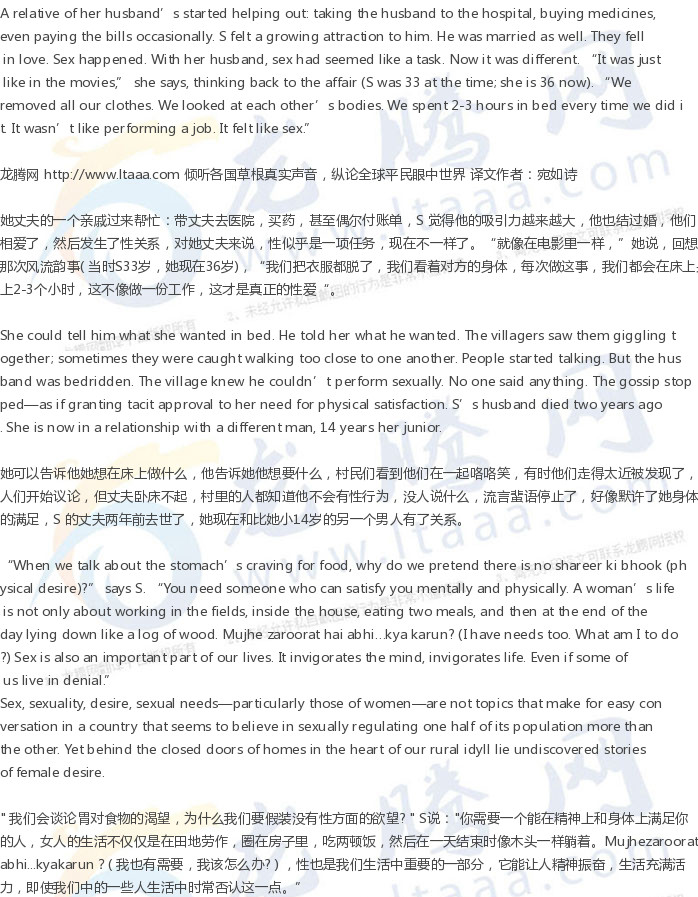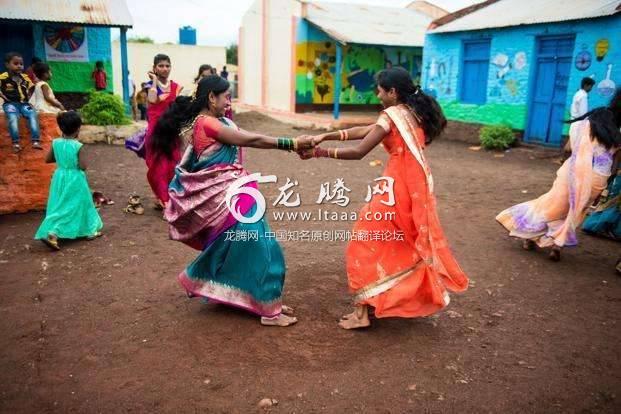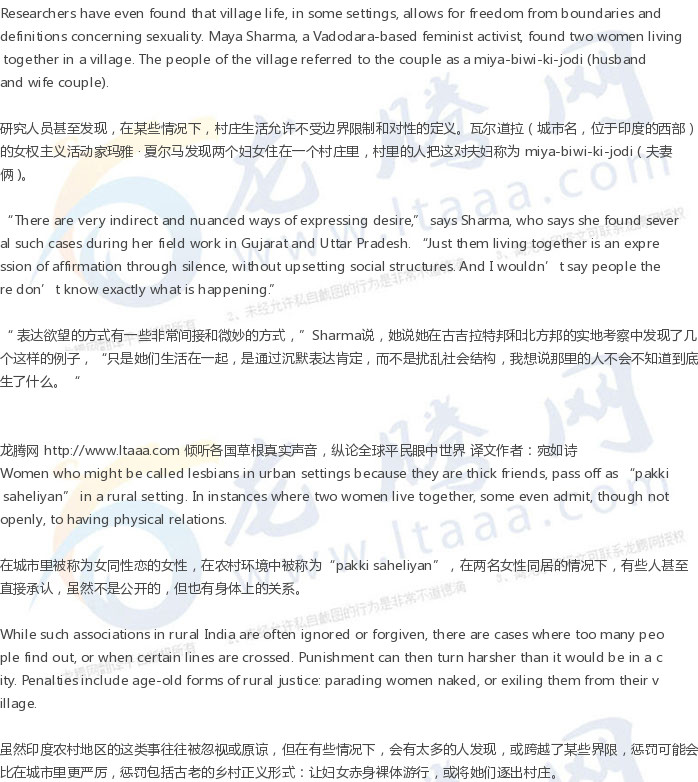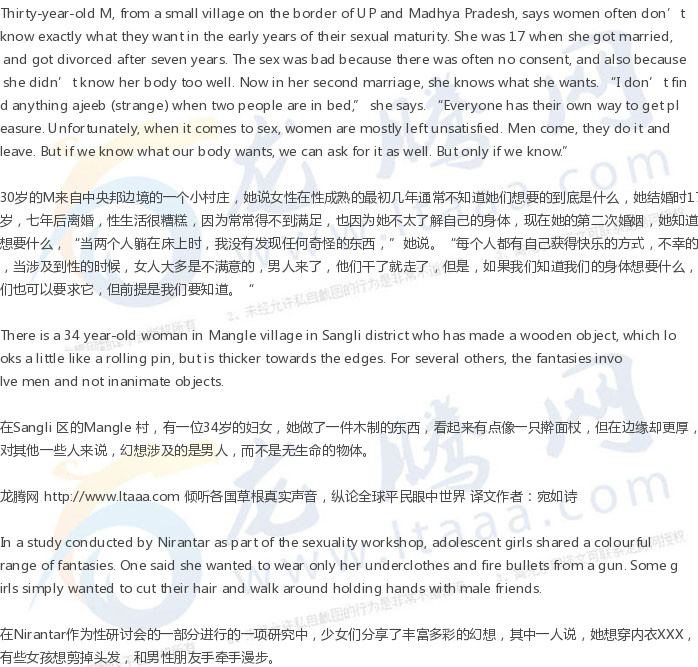性与村庄:印度农村妇女的性生活 [印度媒体]
S 第一次发生性关系是和她的丈夫,她17岁,她的丈夫25岁,他们是马哈拉施特拉邦桑利区的奶农,他们结婚的头五年有两个孩子,性生活还不错,不是很好,但至少她得到了,然后丈夫开始酗酒,而且越喝越多,这种关系减弱了,性行为的频率也减少了,他大部分时间都喝得醉醺醺的,几乎没什么心情,她想要爱,但她也想要性。
The first time S had sex was with her husband, she was 17, her husband 25. They were dairy farmers in Maharashtra’s Sangli district. They had two children in the first five years of marriage. The sex was fine. Not great, but at least she was getting it. Then the husband started drinking, and drinking more. The relationship weakened, and the frequency of sex waned. He was inebriated most of the time, and hardly in the mood. S wanted love, but she also wanted sex.
S 第一次发生性关系是和她的丈夫,她17岁,她的丈夫25岁,他们是马哈拉施特拉邦桑利区的奶农,他们结婚的头五年有两个孩子,性生活还不错,不是很好,但至少她得到了,然后丈夫开始酗酒,而且越喝越多,这种关系减弱了,性行为的频率也减少了,他大部分时间都喝得醉醺醺的,几乎没什么心情,她想要爱,但她也想要性。
She told him her body was “burning with desire”. He said, “Have some shame. You have two children now. Who is putting these thoughts in your head? Koi yaar hai kya? (Do you have a lover?).” She stopped asking. She continued working on their field, raising the children, tending the cattle, and selling milk. Her husband grew unwell.
她告诉他,她的身体“被欲火焚烧”,他说,“有点羞耻感,你现在都两个孩子了,是谁把这些想法灌输到你脑子里的?Koi yaar hai kya?(你有情人吗?) ,于是她不再问了,她继续在地里干活,养育孩子,照料牲畜,卖牛奶,后来她丈夫生病了。
This is backed by the Union government’s National Family Health Survey (NFHS-4), published in December. The survey has a number of findings. Compared to urban women, rural women have sex earlier in life (urban women begin having sex almost two years later than rural women); the frequency of sex is higher; and they have more sexual partners in their lifetime.
这项研究得到了联邦政府12月公布的全国家庭健康调查(NFHS-4)的支持,这项调查有许多发现,与城市妇女相比,农村妇女的性生活时间较早( 城市妇女开始性生活的时间比农村妇女晚了接近两年 ),性生活的频率较高,她们一生中有更多的性伴侣。
While the number of women we met for this story is hardly representative of how rural women navigate desire, we found, repeatedly amongst the women we talked to, a discernible openness around sexuality, and the acceptance of desire as a basic need.
虽然我们在这个故事中遇到的女性人数,很难代表农村女性如何驾驭欲望,但我们发现,在我们交谈过的女性中,多次出现了明显的性开放感,以及将欲望作为基本需求的态度。
Brinjals and belans
In the village of Charan, a few miles from S’s home, a group of women sit together, laughing about a recent incident. An unmarried woman, in her late 20s, was sexually aroused, but didn’t want to “commit a sin” by sleeping with a man. She tried to pleasure herself by inserting a stone pestle used to ground spices into her vagina. She confided in a neighbour, who immediately told others. “Usay araam mila, magar gaon hansta raha (She felt better, but the village ridiculed her),” says P, a 32-year-old farmer. The ladies have a host of ribald anecdotes. Another woman inserted a long green brinjal in her vagina, the stem broke off with the vegetable still inside her. She had to be taken to hospital. The whole village came to know of it.
茄子和擀面杖
在离S家几英里远的查兰村,一群女人坐在一起,笑谈最近发生的一件事,一位20多岁的未婚女性性,虽有性冲动,但她不想因和男人上床而“犯罪”,她用一只磨香料的石杵自慰,她向一位邻居吐露了心里话,邻居立即告诉了别人,32岁的农民P说:“usay araam mila,magar gaon hansta raa( 她感觉好多了,但是村子嘲笑她 )。”女士们一大堆粗俗的轶事,另一个女人在她的阴道里插了一个绿色的长茄子,然后茎断了,茄子还在她体内,她不得不被送进医院,全村的人都知道了这件事。
But in this group, sympathies lie firmly with the women. “Ichchha aayi toh kya karey koi? Itni takleef hoti hai (What is one to do when overcome with desire? It’s so frustrating)”, says 43-year-old A. A says the women of the village have age-old solutions to deal with ardour. One solution involves massaging the vaginal area with coconut oil to “cool it off”.
但在这一群体中,对妇女的同情是坚定的,“Ichchha Aayi toh kya karey koi?”当一个人被欲望征服的时候,该怎么办呢?43岁的A说:“这太令人沮丧了。”他说,村里的妇女们有着古老的办法来解决问题,一种解决方案是用椰子油按摩阴道部位来“冷却它”。
In another workshop, one woman said, “If I want to eat four rotis, and in my house I can only get three, I obviously have to go to the neighbour for the fourth.” In another, a woman said, “Parday mai hi zarda banta hai (It is behind the veil that the real action happens).”
在另一个讲习班上,一个女人说:“如果我想要吃四个烙饼,在我的房子里,我只能得到三个,我显然得去邻居家找第四个。”在另一个故事中,一个女人说:“Parday mai hi zarda banta hai(真正的行动发生在面纱背后)”
In Kokrud village in Sangli district, 36-year-old B has earned a reputation among the other women in her village for being gutsy. They call her “bohot daring”. B lives in a joint family. Her husband, 11 years older than her, migrated to Mumbai within a month of their marriage. He visited twice a year, for four-five days at a time. While the husband was away in Mumbai, his nephew, the same age as B, tried to force himself on her. She resisted. But the next time he tried it, she let him. Soon she was enjoying the sex. The nephew tried new things—things that felt unnatural with her husband. “My husband used to turn me upside down, make me watch dirty movies, make me do dirty things using my mouth. I thought he was an animal,” says B. Her husband is no more, but she still lives with his family, who know about her relationship with the nephew. They have been together for six years. The nephew is married now.
“In such situations, families think it is better if the woman gets involved with a man in the household,” says Sangita Ananda Bhingardeve, who works with Sangram, a health and human rights NGO based in Sangli. “Ghar ki baat ghar mai hi rahegi (The matter will stay in the house). Even if they have kids, the kids will have the same bloodline.”
在Sangli区的Kokrud村,36岁的B在村里的妇女中因勇敢而赢得了声誉,他们称她为“大胆姐”,B生活在一个共同生活的大家庭里,她的丈夫比她大11岁,他们结婚后不到一个月丈夫就去了孟买,他每年回来两次,每次四至五天,丈夫在孟买时,他的侄子,和B同龄,试图强迫她,她反抗了,但第二次他这样时,她接受了,很快她就开始到享受性爱的乐趣,侄子尝试了一些新的东西——一些她丈夫会感到不自然的东西。“我丈夫过去常常把我弄得天翻地覆,让我看下流电影,让我用嘴做肮脏的事情,我觉得他是个畜生。“ B说,她的丈夫已经不在了,但她仍然和他的家人住在一起,他们知道她和侄子的关系,两人在一起六年了,侄子现在结婚了。
A group of six women sitting outside Kokrud village in Sangli district recall an incident from about seven months ago. In the village of Islampur, in Ratnagiri district, a widow was banned from entering her village.
Sangli区Kokrud村外的六名妇女回忆起大约七个月前的一件事,拉特纳基里区的伊斯兰普尔村,一名寡妇被禁止进入她的村庄。
“Her mistake could not be accepted at all, not by the men in the family,” says Y, a tailor working in Kokrud. It had been years since her husband died. When her belly became slightly protuberant, people started asking questions. Initially, she told people that she had a gaanth (knot) in her stomach and later stopped going out of the house. To keep the matter under wraps, she gave away her newborn to an orphanage.
在Kokrud工作的裁缝Y说:“她的错误根本不能被接受,家庭中的男人也不能接受。”她丈夫去世已经好几年了,当她的肚子微微隆起时,人们开始问她原因,起初,她告诉人们,她的胃里有个结,后来她就不再出门了,为了保密,她把她的新生儿送到了孤儿院。
Yet, the village did come to know of it. When the devar found out, he approached the panchayat. The panchayat asked her to pay a fine of ?20,000. That wasn’t the end of it. The devar insisted the woman should never set foot in the village again. The woman now lives with relatives in a nearby village; her teenage daughters live with her in-laws.
然而,村里确实知道这件事,被小叔子发现后,他去了村务委员会( panchayat),村务委员会要她交两万的罚款,但事情还没结束,小叔子坚持说这个女人再也不应该踏进这个村子,这位妇女现在和亲戚住在附近的一个村庄,她十几岁的女儿和她的婆婆住在一起。
A hierarchy of desire
It is inevitable that in a hierarchical society like India, the way sexuality is expressed by women is also dependent on the caste, religion, and class they belong to.
欲望的等级
在像印度这样等级森严的社会中,女性表达性的方式也必然取决于她们所属的种姓、宗教和阶级,这是不可避免的。
A great deal of Dalit literature points to how upper-caste men have for centuries exercised a sexual “right” over Dalit women when male members of these women’s families are in their employ. Yet only some of these relationships find high caste sanction. For example, an upper-caste married man can have a physical relationship with a Dalit woman, but an unmarried upper-caste man cannot, because he could potentially marry her.
大量的达利特文献指出,几个世纪以来,当这些妇女家庭的男性成员受雇于他们时,上层种姓的男子如何对达利特妇女行使性“权利”,然而,只有其中一些关系才会被高种姓认可,例如,一个上等种姓的已婚男人可以和一个贱民女人发生肉体关系,但是一个未婚的上层种姓男人却不能,因为他有可能娶她。
Dirty talk
Hunger and sexual desire are universal, visceral, primal. Perhaps this is why hunger has long been used as a metaphor for sex across cultures. These villages in the heart of India are no exception.
情色对话
饥饿和性欲是普遍的,本能的,原始的,也许这就是为什么饥饿一直被用作跨文化性的隐喻,印度中部的这些村庄也不例外。
In Banda district in the Bundelkhand area of Uttar Pradesh (UP), the wedding season is in May-July and January-February. While marriage is the bride and groom’s big day, it is also a day for the village women to vent their frustrations with men, the enforcement of sexual regulation, and married life in general.
在北方邦邦德尔坎德地区的班达区,婚礼季节是5月至7月和1月至2月,结婚是新娘和新郎的大日子,也是乡村妇女发泄对男人的不满、执行性规定和一般婚姻生活的日子。
On the day of a marriage, a tent is set up and women gather to perform behlaul. Behlaul happens in the bridegroom’s house after the baraat (groom’s party) has left. Two women sit back to back. Other women come and touch their breasts and other body parts; sometimes gesturing with a rolling pin (belan). An older woman acts as husband while a younger one plays the wife. “Tambuaaa taan tanay gori/Tambuaa taan tanay gori (the tent has been set, girl),” they sing. The role-playing goes on for about an hour, and the discussion can veer from subjects like pubic hair to the first night of marriage to detailed accounts of sex.
在结婚的那一天,人们搭起帐篷,妇女们聚集在一起行礼,在新郎的聚会结束后,Behlaul(词义不明,印地语词汇) 就会出现在新郎的房子里,两个女人背靠背地坐着,其他的女人来摸她们的胸部和身体的其他部位;有时用擀面杖打手势,年长的妇女扮演丈夫,而年轻的妇女扮演妻子,她们唱道:“Tambuaaa Taan Tanay Gori/Tambuaa Taan Tanay Gori( 帐篷已经搭好了,女孩 )”,角色扮演大约持续一个小时,讨论的话题可以从阴毛到婚姻的第一夜,转向对性的详细描述。
“The rural openness around sexuality is reflected in the songs they sing,” says Prem Chowdhry, a Haryana-based gender researcher and the author of Contentious Marriages, Eloping Couples: Gender, Caste And Patriarchy In Northern India. “A few years ago men became so resentful that they went to the Khap panchayat trying to ban these songs. Women sing about coveting lower-caste men and imagine them as their grooms. That upsets men, because they think their women are questioning their virility.”
哈里亚纳邦性问题研究人员普雷姆乔杜里说:“她们唱的歌反映了农村对性的开放。”他着有《有争议的婚姻私奔的情侣:印度北部的性、种姓和父权制》一书。“几年前,人们变得如此愤恨,以至于他们去了哈普村,试图禁止这些歌曲,女人歌颂对低种姓男人的垂涎,并把他们想象成自己的新郎,这让男人感到不安,因为他们认为女人在质疑他们的男子气概。“
By the early 20th century, pulp fiction, semi-pornographic sex manuals, romances in colloquial Hindi, and Braj songs and poems were widely available in UP. Even today in markets in UP, you will easily find raunchy books, playing cards with images of sexual positions and naked women, and bioscopes with such photographs inserted between pictures of the Taj Mahal or Qutb Minar.
到了20世纪初,低俗小说、半色情手册、印度口头流传中的浪漫故事、布拉吉歌曲和诗歌在“向上”广泛流传。即使在今天的市场上,你也很容易找到淫秽的书籍、带有性姿势和裸体女性图像的扑克牌,以及在泰姬陵或库特布·米纳尔照片之间插入此类照片的老式放映机。
While women might have been reluctant to access such material out of fear of being seen, mobile phones have made things easier. Pornography is now downloaded online, or purchased from a kirana store (by men).
虽然女性可能因为害怕被人看到而不愿接触这些东西,但手机使事情变得更容易,色情作品现在可以在网上下载,也可以从kirana商店购买(男性) 。
With hardly any access to sex education, navigating desire is a fraught enterprise. A lot of the women this reporter met spoke about watching porn after marriage mostly because their husbands wanted them to watch it along with them—as a way to legitimize desire. They watch desi porn, which they find easier to relate to and learn from.
由于几乎没有机会接受性教育,引导欲望是一项令人忧心的工作,记者遇到的很多女性谈到婚后看色情片,主要是因为她们的丈夫想让她们和她们一起看——这是一种使欲望合法化的方式,他们看的色情电影,他们发现更容易与之联系,并从中学习。
Then there is S. Her arms hurt from milking the cows everyday. Sometimes even the walk from the field to her home seems too long and lonely. Her clan doesn’t allow widows to remarry. But for her, to desire and to be desired are things she doesn’t need societal approval for. She says if she keeps worrying ki log kya kahenge (what will people say), who will worry about her? Two decades after the first time she had sex, it’s not the man alone who calls the shots in the bedroom. Sex is never over till S too has had an orgasm.
还有S,她每天挤牛奶,胳膊都会疼,有时,甚至从田里到她家的路也显得太长,太孤独了,她的家族不允许寡妇再婚,但对她来说,渴望和被追求是不需要社会认可的事情,她说,如果她一直担心Ki log kya kahenge(人们会怎么说),谁会担心她呢?在她第一次做爱20年后,并不是只有男人在卧室发号施令,性永远不会结束,直到S也有了高潮。
版权声明
我们致力于传递世界各地老百姓最真实、最直接、最详尽的对中国的看法
【版权与免责声明】如发现内容存在版权问题,烦请提供相关信息发邮件,
我们将及时沟通与处理。本站内容除非来源注明五毛网,否则均为网友转载,涉及言论、版权与本站无关。
本文仅代表作者观点,不代表本站立场。
本文来自网络,如有侵权及时联系本网站。
图文文章RECOMMEND
热门文章HOT NEWS
-
1
चाइना में रेडी और ठेले Local shops in china || L...
- 2
- 3
- 4
- 5
- 6
- 7
- 8
- 9
- 10
推荐文章HOT NEWS
-
1
चाइना में रेडी और ठेले Local shops in china || L...
- 2
- 3
- 4
- 5
- 6
- 7
- 8
- 9
- 10


















